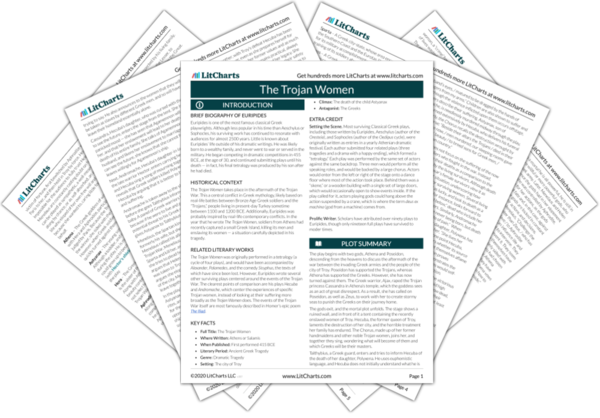The Cost of War
The Trojan Women is set in the immediate aftermath of the Trojan War. The Trojan War and its fallout are the setting for many of the most famous classical works of literature, including the Iliad, the Aneid, Aeschylus’s Agamemnon, and many of Euripides’ surviving plays. Historical accounts of the Trojan War are limited, but in Greek mythology it is described as a ten-year war during which the Greek army laid siege to the city…
read analysis of The Cost of WarFate, Fortune, and the Gods
The world of The Trojan Women is unpredictable. Fortunes are in constant flux, and fates are turned upside down in the span of days or even hours. A woman can be queen one day, and a slave the next; children can have long lives ahead of them, and then be sentenced to death; a warrior can expect to take a few months to sail home, but instead spend ten years on his journey because the…
read analysis of Fate, Fortune, and the GodsDuty, Obligation, and Integrity
The characters in The Trojan Women, whether Trojan or Greek, are motivated by their bonds to their family and culture. For the Trojans especially, who have lost everything—their city, their husbands, their freedom—a clear moral system gives their lives some structure and regularity. Hecuba, who has arguably fallen the farthest in fortune’s favor, clings most tightly to these ideas of family obligation and civic duty. Much of her hatred for Helen comes from…
read analysis of Duty, Obligation, and Integrity
Men and Women
Unsurprisingly, given the play’s title, the women in The Trojan Women are its protagonists, and their experiences and suffering are the play’s primary concern. The play was written around 415 BCE, but describes semi-fictional events that supposedly took place 700 years earlier. In Euripides’ day, in Ancient Greece, women had few rights. They were first the property of their fathers, and later of their husbands—and, like slaves of any gender, were ineligible for citizenship. This…
read analysis of Men and Women






